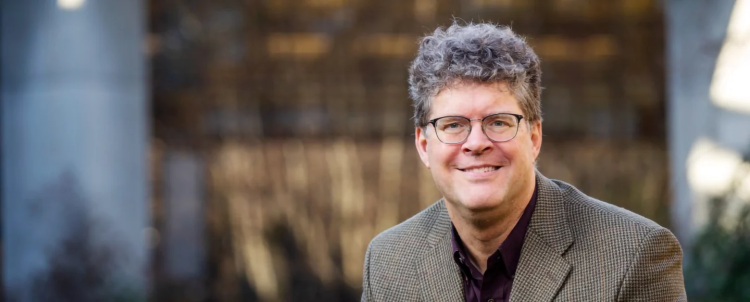UVic professor Mark Lewis is being recognized by Royal Society in the UK for his collaborative work developing new mathematical methods to solve ecological problems
A love for math, ecology, and people. It's a combination that has made Mark Lewis a force to be reckoned with and more recently, has led to his election to the Fellowship of the Royal Society, the UK's national academy of sciences.

Mark Lewis, a UVic mathematical ecologist and the Gilbert and Betty Kennedy Chair in Mathematical Biology.
Lewis, a mathematical ecologist and the Gilbert and Betty Kennedy Chair in Mathematical Biology, has spent his career using math to enhance environmental stewardship. His ground-breaking research has solved long-standing mathematical questions that are fundamental to ecology, and has helped to reveal how the natural world works and the impacts of our human activity on nature, changing policies and regulations along the way.
"I feel very honoured to be elected as a fellow," says Lewis. "While it's nice to get a pat on the back, it's not just about me. Mathematical biology is an emerging field, and it's great to see it getting recognition and attention. Much of the credit goes to the amazing group of graduate students, postdoctoral researchers, and collaborators I've had the privilege to work with."
Royal Society fellows are researchers whose achievements represent the very best of scientific endeavour, and who have made a substantial contribution to the improvement of our understanding in mathematics, engineering science and medical science. Lewis is one of 95 researchers, and four Canada-based researchers, elected to the fellowship this year, joining the ranks of Stephen Hawking, Isaac Newton, Charles Darwin, Albert Einstein, Lise Meitner and Dorothy Hodgkin. He is the fifth known UVic-affiliated researcher to be named a fellow.
Combining math and biology to create impact
Lewis is an interdisciplinary scientist whose work sits at the intersection of mathematical analysis and environmental biology. In most ecological situations, there are many variables and the interactions can be complicated. Lewis develops and applies models to these situations and has made a career of applying existing methods in innovative ways to create new mathematics and solve previously unsolvable problems. He has formed new mathematical theory that has allowed scientists model animal movement and territories, identify ecological dynamics in aquatic systems, and determine the spread of invasive species and of disease among wildlife.
"When I first started, I was more interested in pure math," says Lewis. "I loved to analyze equations and prove results. Over the years, I've become more and more interested in real ecological issues that have an impact on society."
Lewis has unquestionably had an impact on society and has raised and resolved many issues of importance to environmental biology. His collaborative work examining how changing ice conditions affects polar bear reproduction and survival was used to get polar bears categorized as vulnerable on the International Union for Conservation of Nature's Red List. His lab group's research studying interactions between salmon and sea lice provided evidence of the impact salmon farming was having on wild salmon populations, motivating improvements in parasite control on fish farms; this research continues to inform management and decision-making around aquaculture regulation in Canada today. And his work on invasive species spread has impacted US Environmental Protection Agency regulations and contributed to detailed prediction and control strategies for aquatic invaders in British Columbia and Alberta. The examples are plentiful.
A passion for people
While the biology is often focused on animals, and the math is often focused on numbers, Lewis's true passion seems to be people.
"The best part of doing this work is the people," says Lewis. "Collaborating, sharing ideas that's half the fun. If there's a bunch of good people working toward something, it's fun to be a part of it."
Lewis's penchant for people extends to mentorship. Throughout his career, Lewis has mentored almost 100 graduate students and post-docs, about half of whom are now faculty members at universities worldwide. In 2023, he co-created the Maud Menten Institute, which is connecting students and postdoctoral fellows in mathematical biology with industry, government and non-profit organizations, creating a non-academic pipeline for mathematical biologists. Lewis has also spent time serving as the President of both the Canadian Mathematical Society and the Society for Mathematical Biology.
Coming home
While Lewis completed his undergraduate degree in mathematics and biology at UVic, it wasn't until 2022 that he returned to campus as a professor. As the newly created Gilbert and Betty Kennedy Chair in Mathematical Biology, his goal is to develop, strengthen and build capacity for mathematical biology at UVic. In just a few short years, he has initiated collaborations with researchers across both the math and biology departments, and has created two new courses: Introduction to Mathematical Biology (MATH 376) and Models in Ecology (BIOL 470). Under his mentorship, students have been discovering mathematical biology, and undertaking projects related to tuberculosis, Nordic reindeer and more.
A long list of accolades
Being elected to the Royal Society (UK) isn't the first recognition Lewis has received for his work. In 2011, Lewis was the youngest ever recipient of the CRM-Fields-PIMS Prize for exceptional research in mathematics. He received a 2012 Killam Research Fellowship, is a fellow of all three mathematical societies of which he is a member, was elected to the Royal Society of Canada in 2015, and in 2024 received the Akira Okubo Prize from the Society for Mathematical Biology and Japanese Society for Theoretical Biology.











